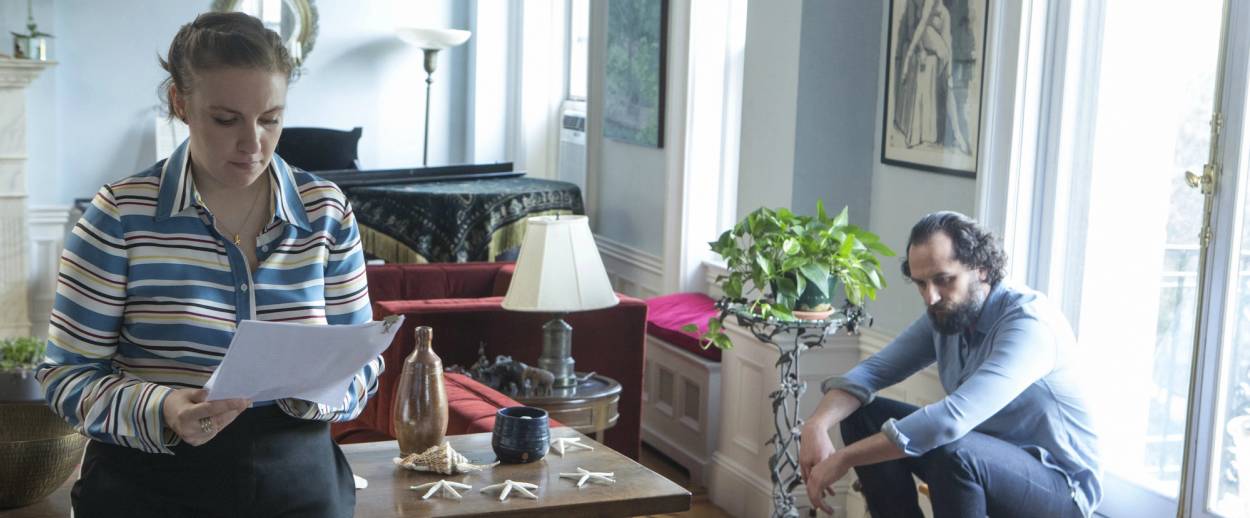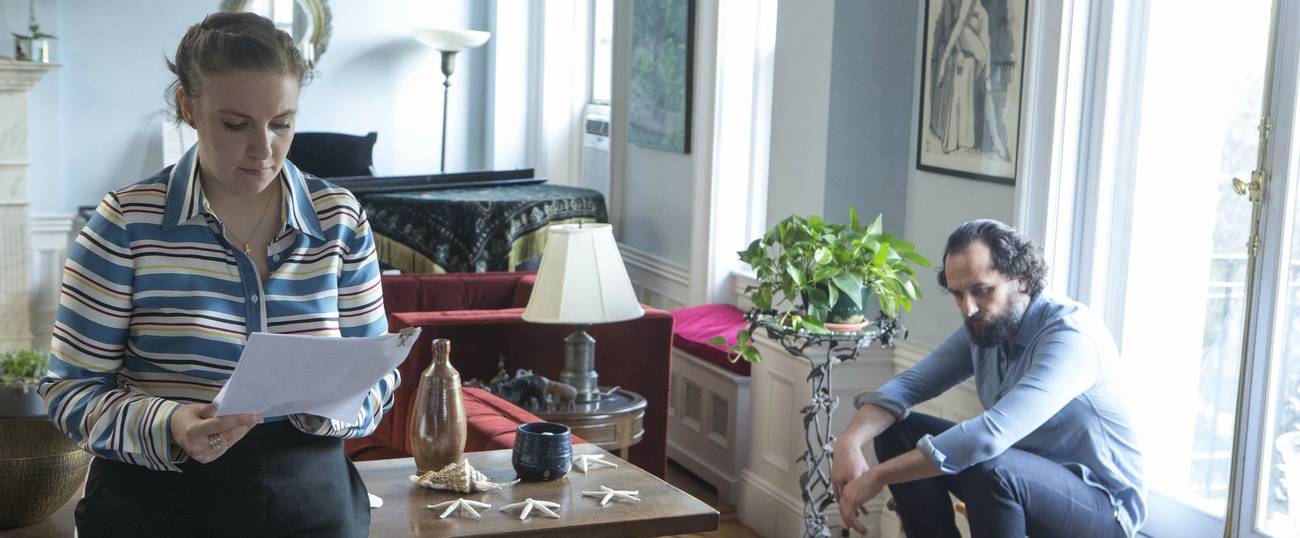On ‘Girls,’ Hannah Has a Strange Encounter With a Dubious Writer
Clutching a Philip Roth novel, Hannah finds herself in a precarious situation with a disreputable author she admires




In my opinion, the latest episode of Girls is one of the best in the show’s entire series. It’s proof positive that Lena Dunham can still create a singular and nuanced perspective about sex—and the so-called gray areas of sexual consent (or abuse, depending on how you see it).
“American Bitch” focuses on Hannah’s visits to the posh apartment of one of her favorite writers, the fictional Chuck Palmer (played by Matthew Rhys). Palmer has invited her to his pad to discuss a scathing character indictment she published on a Jezebel-esque website regarding allegations that he sexually assaulted college-age female fans, including a particular instance when he allegedly coerced a young woman into fellatio. Hannah and Chuck engage in an extraordinarily smart, nuanced conversation, during which Hannah finds herself torn between her love of his literary work and her outrage as a feminist. The episode is fueled by empathy, humanity, and a refusal to skirt the hard questions. Chuck is misunderstood. He is anxious (and Hannah knows from anxiety). He appeals to Hannah’s sympathy as a fellow writer. He claims that he is the real victim here: His accusers, he insists, were simply looking for a good story. He, on the other hand, just wanted to get to know them and their stories. (He actually gives Hannah a first-person account of the dubious sexual interaction in question, and has her read it.)
So Hannah tells him one of her own: Her fifth-grade teacher praised her intelligence and also inappropriately massaged her head, neck, and shoulders during class. Years later, she tells Chuck, she ran into a classmate and told him about this instance—Hannah describes the teacher as a “molester”—but her classmate didn’t empathize and instead showed concern for the teacher’s reputation. Chuck, on the other hand, is moved by her story.
In the next scene, Hannah and Chuck are in his bedroom. She looks over his books and is excited to see that he has a signed copy of Philip Roth’s When She Was Good, which was originally titled American Bitch according to Hannah (“I have no idea if that’s true, can’t find any proof on the internet, but God, if it is… that’s so good.”). He generously offers her the book—When She Was Good was Roth’s only novel featuring a female protagonist—and from that point on she clutches it to her chest.
Chuck asks her if she would like to lie down with him. He assures her that they will be keeping their clothes on—an assumed assertion of power over Hannah in itself. Still, this invitation should have been a red flag to Hannah, especially coming from Chuck who has a reputation of taking advantage of young women. But at this point, Hannah and Chuck have come to a degree of mutual understanding, and she trusts him; it seems innocent.
It wasn’t.
Within seconds of lying down, Chuck takes out his erect penis—a rare moment of male nudity on Girls—and rubs it against her leg. Hannah takes a moment to react. Ostensibly in shock, she grabs his penis, as if by instinct. But it is not an erotic moment. Then, she jumps off the bed and calls him out; Chuck responds with a slimy, self-satisfied smile, as if he has made his point. Hannah and Chuck’s conversation over the course of the episode revolves around the so-called gray area of consent, brought about by the power differential between a famous, influential writer and his adoring readers. Chuck, a writer she admires, has exploited this very fact and Hannah is on the receiving end of it.
It is no coincidence that Hannah clutches Roth’s book when she’s on Chuck’s bed, both before and after the incident. This is not the first time we’ve heard about her love of the great Jewish American writer: In Season 5, Episode 2 (“Good Man”), she finds herself called to account for her choice to teach Goodbye, Columbus to middle-schoolers (and hilariously notes, as an aside, her sexual attraction to Philip Roth). So it should not be a surprise that the Roth book is more than a mere prop.
One of Roth’s most well-trodden thematic paths is that the author himself was infamously accused of being guilty of his characters’ indiscretions. His brilliant, mind-bending response to being conflated with his Alex Portnoy was to create, in later fictions, a fictional writer alter-ego (Nathan Zuckerman, e.g.) who faced similar criticisms. In fact, at one point, Hannah tells Chuck her opinion of the author: “I know I’m not supposed to like [Roth] because he’s a misogynist and demeans women, but I can’t help it.”
Once Hannah does register her shock, jumping off the bed, Chuck is called away by his daughter, who comes home in the nick of time. Hannah stands in the bedroom, still processing the moment, still holding the book. Then, she recoils in horror, as if touching a hot stove, and chucks Roth’s novel across the room.
In reality, I believe that Hannah, in the above quote, perhaps unconsciously, is referring to Chuck and not to Philip Roth, whose character is not actually in question here. Chuck’s reputation as a philanderer, Hannah finds out, is quite real. In a sense, Roth is a symbolic vehicle through which Hannah reacts to her complicated relationship with Chuck. Chuck’s sexual conduct, she realizes, crossed a line—one that she perhaps knew he would violate. And this is where the “grey area” comes into focus. On one hand, Chuck has taken advantage of their power dynamic, in which he seemingly holds the upper hand. His actions could very well be viewed as sexual assault. But Hannah is not without agency here. She did go to the apartment of a man whose sexual misconduct she’d chronicled online. Nothing that happened afterward is a surprise, but that doesn’t make it any less despicable. Or any less complicated.
Miranda Cooper is an editorial intern at Tablet. Follow her on Twitter here.